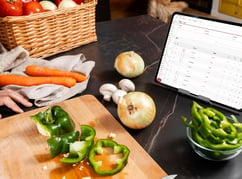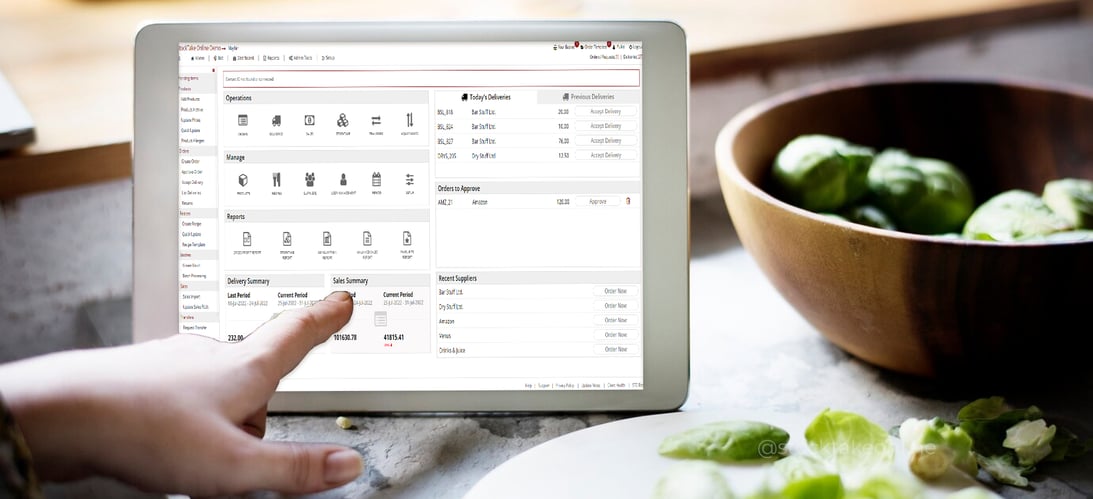
In the world of culinary excellence, every dish tells a story, and chefs strive for perfection. At the heart of a successful kitchen lies an essential element: effective recipe management system. Whether it is a cosy café or a bustling restaurant, the software is indeed resourceful.
In today's digital age, traditional paper-based systems can no longer keep up. Recipe management software helps restaurants and bars to become more efficient. This powerful tool ensures there is no human error.
Why Effective Recipe Management is Crucial for Modern Kitchens
Picture a busy restaurant kitchen during peak hours – orders pouring in, pans sizzling, and chefs bustling about. In such a frantic environment, it is very important to have software working for you to avoid errors. It serves as the backbone of kitchen operations as it stops ingredients from going to waste. Modern kitchens have a lot of competition and having to manage recipes on the go, adding allergens, and creating templates is very important.
Overview of Challenges in Traditional Recipe Management
Imagine a hectic restaurant kitchen during busy times where orders keep coming in, pans are always sizzling, and chefs are rushing around. In this ever-changing environment, having an efficient recipe management system is a hard-to-deny requirement. Kitchen operations become ten times easier when we use technology, to minimise mistakes, and get better results. Whether it is monitoring supplies, quickly adjusting recipes, or catering to dietary needs, recipe management software is what keeps the kitchen operations running smoothly at rapid times.
The Evolution of Recipe Management
The rise of technology has drastically changed how we manage recipes the day-old pen and paper are no longer in use. Maintaining logbooks took most of the time of the kitchen staff, but cloud-based systems reduce the effort and save paper. Now the errors are reduced and so is the time consumption.
Benefits of Adopting Recipe Management Software
One cannot deny the benefits of recipe management software as it comes in handy:
Better efficiency and productivity:
The recipe management software not only reduces error but improves overall management.
Efficient precision and character:
Humans can miss out on accurate data, but the right software will give you on-point information.
Accurate inventory management:
The software helps staff efficiently use the ingredients, minimises excess waste, and manages stock levels.
Improved staff communication:
If the kitchen staff communicates with each other and knows what is going on at every step it will be very helpful.
Proper menu planning:
Plan the menu according to the taste of your customers and the theme of your restaurant.
Key Features of Recipe Management Software
When selecting best recipe manager app for your kitchen, it is crucial to consider these key features:
Inventory management synchronisation:
Easily link recipes with inventory levels, so you always have the required ingredients on hand.
Nutrition analysis and dietary information:
Get complete nutritional data and accommodate the dietary needs of the customers without any hassle.
Adaptability:
The software should adapt to the needs of your restaurant, whether you run a small bistro or a large restaurant and bar chain.
Ease of use:
Make sure chefs and kitchen staff can operate the software easily without a lot of training to save time and training costs.
Integration with POS:
The software should integrate efficiently with your existing POS systems while safeguarding your data.
Choosing the Right Recipe Management Software
Understanding your hospitality business after studying it properly and making the improvements you will get the results you are looking for. Make sure to ask yourself these questions before deciding which software suits you the best:
- Will it grow with the growing business?
- How easy is the software to use for the staff?
- Will staff need a lot of training?
- Will I get 24x7 customer support?
- Will it work with my existing POS system?
- Is it easily available to use and user-friendly?
- Are there any hidden costs?
Once you find the answers to these questions it will be easier for you to decide which software works best for you.
Implementation Strategies
Train staff for efficient utilisation:
Provide comprehensive training sessions so all staff feel comfortable using the software.
Data migration and integration planning:
Transfer existing recipes and ingredient data to the new software platform to ensure a smooth transition.
Set up standard operating procedures:
Establish protocols and guidelines for creating, modifying, and approving recipes.
Streamlining Kitchen Operations
With recipe management software, kitchen operations become efficient. Here's how:
Optimising recipe creation and modification:
Chefs can experiment with new dishes, adjust recipes on the mobile, and track changes in real-time.
Real-time ingredient tracking and cost analysis:
Monitor ingredient usage, track costs, and identify opportunities for cost savings.
Enhancing collaboration between kitchen staff:
Facilitate communication and collaboration between chefs, sous chefs, and line cooks, ensuring a smooth workflow.
Ensuring Compliance and Consistency
Meeting regulatory standards is very important when it comes to recipe management for safety requirements. Maintain quality and taste across all dishes by adhering to established recipes and portion sizes across all locations. Never miss out on tracking changes add allergens and create templates at the same time. This cuts down the need to create the same recipe at multiple locations and allergens can help the staff become more aware.
Improving Menu Management
Changing your menu from time to time will get more people to try out your restaurant. Experimenting with new dishes and recipes can get you an infallible menu to rely on. When you find that perfect menu analyses recipe performance and get customer feedback to see what is working for you and what is not. Work on seasonal menus and create special events to gain more attention for your restaurant and bar.
Enhancing Communication and Coordination
Eliminating the hassle of creating the same recipe at different locations acts as a faster medium to keep the staff going. Templates work like magic in these scenarios. Centralising recipes and updates at various locations will not just save time, but also resources. Make sure to notify the staff about the changes and special instructions beforehand. Facilitating communication between the kitchen and front-of-the-house staff is equally important for proper recipe management.
Maximising Efficiency in Food Production
The recipe management software is more than just a way to streamline operations - it transforms the way kitchens work. Automating production processes, reducing prep time, and ensuring consistent portions and presentations will help you manage your inventory and reduce waste. Picture a kitchen where every dish is made with care and precision, where every ingredient is accounted for, and every customer leaves satisfied. It can help you predict demands and adjust orders accordingly. Make sure the products are integrated with the recipe management software at all times for accurate inventory overseeing.
Measuring Performance and Analysing Data
Measuring performance helps you better understand your restaurant’s performance from a bigger angle. By using the key performance indicators, you can make informed decisions. End-of-the-day reports help you see if there are any human errors on time and rectify them timely. When you identify the areas for improvement and optimisation you can work on the issues and make profits soar.
Scalability and Growth Opportunities
Every restaurant and bar is looking to expand and having assistance in the form of software is a bonus. Recipe management software is the need of the hour, and we need to adapt to the changing world. Whether you are opening new locations, trying new dishes, or catering events, your software can support your business as it evolves.
Cost-Effectiveness and Return on Investment
Some people may be hesitant to invest in best recipe management system at first, but the long-term advantages greatly outweigh the initial cost. By calculating the return on investment (ROI) and comparing expenses to potential savings, you can recognise what it would bring to the table and how it will benefit you. The benefits are undeniable in cost reduction as it reduces food waste, cuts down on errors and improves efficiency.

Future Trends in Recipe Management
The future of recipe management looks promising, as we see new developments every other day. Advanced technologies like AI and predictive analytics, as well as integration with smart kitchen devices, have proven to be efficient. Picture a world where your software anticipates your needs, provides personalised suggestions, and automatically adjusts recipes based on customer input. This vision is not just a distant dream as it is very close to becoming reality.
FAQs
Q: What is recipe management software?
A: Recipe management software is a digital tool that helps kitchen management staff create, organise, and update recipes efficiently.
Q: How does recipe management software benefit restaurants?
A: Work efficiently on kitchen operations, improve teamwork, and ensure consistent quality and taste while growing your restaurant/bar.
Q: Can recipe management software integrate with current inventory systems?
A: Yes, most recipe management software can connect with existing inventory systems for smooth operations.
Q: How user-friendly is recipe management software for kitchen staff?
A: Recipe management software is designed with ease of use in mind, featuring intuitive interfaces and simple instructions for kitchen staff at all levels.
Q: Is recipe management software suitable for small businesses?
A: Yes, recipe software can help businesses of all sizes, from small cafes to big restaurant chains.
Q: What security measures are in place to protect recipe data?
A: Recipe software uses strong security like encryption and access controls to keep recipe data safe from unauthorised users.
Q: How does recipe management software handle dietary restrictions and allergies?
A: The software lets you input dietary needs and allergies. It will then flag any risky ingredients for certain customers.
Q: What are the costs of using recipe management software?
A: The cost varies based on the provider and features. But the long-term benefits usually outweigh the initial investment needed.
Q: How does recipe management software adjust to changes in recipes or ingredients?
A: Recipe management software provides users the flexibility to effortlessly update recipes and ingredients. This allows businesses to quickly adapt to evolving recipes or ingredient substitutions without disrupting operations.
Conclusion
Technology is advancing and we need to keep pace with it to grow in today’s world. Restaurant management software can simplify kitchen operations, improve teamwork, and ensure consistent quality while reducing waste. Whether you run a small cafe or a large chain of restaurants/ bars, this software can make your work easier. The ease of use makes them a sustainable choice.
StockTake Online
Are you looking for efficient recipe management software? Check out StockTake Online. Our software’s user-friendly interface, interactive features, and dedicated 24x7 support make it the perfect solution for today's kitchens seeking efficiency and quality. Make sure you use the right software that can integrate with your existing software and import previous data. Tap here to start your journey!


